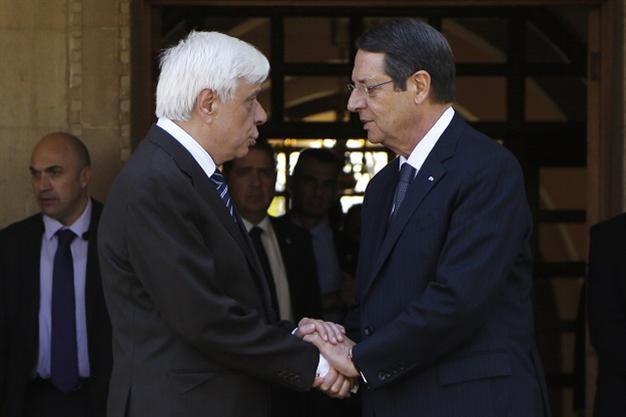Greek Cyprus criminalizes denial of ‘Armenian genocide’
NICOSIA

Greek Cyprus' President Nicos Anastasiades, left, and President of Greece, Prokopis Pavlopoulos, prepare to shake hands at the presidential palace following a meeting in the capital Nicosia, Cyprus, Monday, March 30 , 2015. AP Photos/Philippos Christou
Greek Cyprus has made it a crime to deny the Ottoman Turks committed genocide against Armenian Turks a century ago, a move likely to rile its old rival Turkey as peace talks on the ethnically-split island remain stalled.The Greek Cypriot parliament passed a resolution on April 2 penalising the denial of genocide, crimes against humanity or war crimes, modifying existing legislation, which required prior conviction by an international court to make denial a crime.
“Today is a historic day,” parliament speaker Yiannakis Omirou said, as quoted by Reuters. “It allows parliament to restore, with unanimous decisions and resolutions, historical truths.”
The east Mediterranean island, split after Turkey’s military operation in 1974 after a brief Greek inspired coup, was one of the first countries worldwide in 1975 to recognise the Armenian killings as genocide.
Armenia says up to 1.5 million Ottoman Armenians were killed in a genocide which began in 1915. Turkey denies the deaths amounted to genocide, saying the death toll of Armenians killed during mass deportations has been inflated and that those killed in 1915 and 1916 were victims of general unrest during World War I.
Around 20 countries have recognized the killings as genocide.
The issue has long been a source of tension between Turkey and several Western countries, especially the United States and France, both home to large ethnic Armenian diasporas. Cyprus too has an Armenian population.
Cyprus has been at loggerheads with Turkey for decades. Its ethnic Greek and Turkish Cypriot populations have lived estranged in the south and north of the island respectively since 1974, but seeds of division were sown earlier when a power-sharing government crumbled amid violence in 1963.
Free speech case
The Greek Cypriot lawmakers who passed the resolution now comprise the island’s only internationally recognised parliament.
The European Court of Human Rights (ECHR) had ruled last year the denial of the 1915 mass killings of Armenians as genocide falls within the limits of freedom of expression, following an appeal from a Turkish politician against his conviction in Switzerland.
Workers’ Party (İP) Chairman Doğu Perinçek, who described the Armenian genocide as an “international lie,” had complained the Swiss courts had breached his freedom of expression, based on Article 10 covering freedom of expression.
The ECHR ruling stated “the free exercise of the right to openly discuss questions of a sensitive and controversial nature is one of the fundamental aspects of freedom of expression and distinguishes a tolerant and pluralistic democratic society from a totalitarian or dictatorial regime.”
















